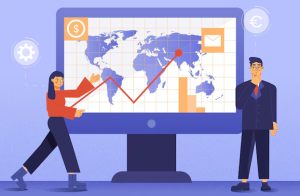The digital economy has emerged as a pervasive force reshaping how we work and manage our finances in the United States. With advancements in technology, industries are witnessing a paradigm shift in operations and employment patterns. Companies are increasingly leveraging automation and artificial intelligence to optimize productivity and reduce costs. As a result, traditional roles are evolving, and new job opportunities are emerging in tech-driven sectors.
This revolution is not just altering job landscapes but also influencing how individuals approach financial management. This digital evolution demands adaptability and foresight from both employers and workers alike. From digital banking to cryptocurrency investments, financial strategies are becoming more diverse and technology-dependent. Understanding these changes is crucial for staying competitive in an increasingly digitized world. Check to know all the details:
The evolving job market landscape

The job market in the United States is undergoing a significant transformation driven by the digital shift. As technology continues to evolve, so do the skills required by employers. The demand for digital literacy is increasing across various sectors, from healthcare to manufacturing. New roles have emerged, such as data analysts, cybersecurity experts, and AI specialists, creating opportunities for those with tech-oriented skill sets. However, this shift also challenges traditional job roles, leading to a need for reskilling and upskilling.
The gig economy, powered by digital platforms, is another aspect of this evolution. Many individuals now prefer flexible work arrangements, offered by companies like Uber, Upwork, and Amazon. This flexibility allows them to balance personal and professional commitments while exploring multiple income streams. However, it also presents challenges, such as securing stable income and benefits traditionally associated with full-time employment.
Opportunities and challenges in the gig economy
The gig economy offers vast opportunities for personal and professional growth. Digital platforms connect freelancers with global clients, allowing them to showcase their skills and work from anywhere. This access to a broader market increases earning potential and fosters entrepreneurship. Individuals can tailor their schedules and project choices to fit their lifestyle, promoting a healthier work-life balance. Moreover, gig work can bridge gaps between full-time roles, helping individuals maintain income streams during transitions. It’s an ecosystem that rewards initiative, adaptability, and efficient time management.
However, the gig economy also poses significant challenges. Stability is a primary concern, as gig workers often face irregular income patterns and lack traditional employment benefits such as health insurance and retirement plans. This uncertainty necessitates proactive financial management and thorough planning. Gig workers must be astute in budgeting, saving, and investing to ensure financial security. Navigating taxation and understanding the legal implications of gig work are additional complexities that require attention.
Impact on traditional employment
Traditional employment is experiencing a transformation due to the pervasive influence of the digital economy. Many industries are integrating digital tools and platforms into their operations, redefining roles previously limited to manual tasks. For example, manufacturing processes are now automated, reducing labor-intensive production lines and creating new engineering and maintenance positions. This shift necessitates a blend of digital literacy and technical expertise for workers across multiple sectors.
Another significant impact is the changing nature of workplace environments. Remote work, facilitated by digital technology, has become commonplace, breaking down geographical barriers and allowing businesses to tap into a global talent pool. This transition demands new management styles and communication strategies that prioritize flexibility and collaboration. Employees must develop competencies in using digital communication platforms and project management tools, ensuring productivity and teamwork remain intact despite physical distances.
Financial planning in the digital age
Financial management is evolving alongside the digital economy, influencing how individuals plan and secure their financial futures. The rise of fintech innovations offers unparalleled convenience and efficiency in managing personal finances. Online banking, mobile payment apps, and digital wallets streamline transactions, while financial planning apps provide real-time insights and budgeting tools. These advancements empower individuals to make informed decisions about spending, saving, and investing from the convenience of their digital devices.
Investment opportunities have expanded significantly with digital finance platforms. Individuals can access diverse investment avenues, including stocks, cryptocurrencies, and peer-to-peer lending, often with lower entry barriers. This democratization of investment empowers individuals to diversify their portfolios and explore new asset classes. However, it also requires a deep understanding of market trends and associated risks.
Embracing fintech innovations
Fintech innovations are revolutionizing personal finance by offering tailored solutions that cater to individual needs. These technologies simplify complex financial processes, making them accessible to a broader audience. Budgeting applications categorize spending, highlight saving opportunities, and set financial goals, empowering users to take control of their finances effortlessly. Robo-advisors provide automated investment advice based on user preferences and risk tolerance, eliminating costly human intervention while maintaining personalized guidance.
Digital payment solutions are another facet of fintech reshaping financial habits. Contactless payments, peer-to-peer transfers, and blockchain transactions accelerate the speed of commerce while enhancing security and transparency. Businesses must adapt to these changing consumer behaviors by incorporating digital payment systems into their operations to remain competitive. The proliferation of fintech services also raises questions about data privacy and security.




